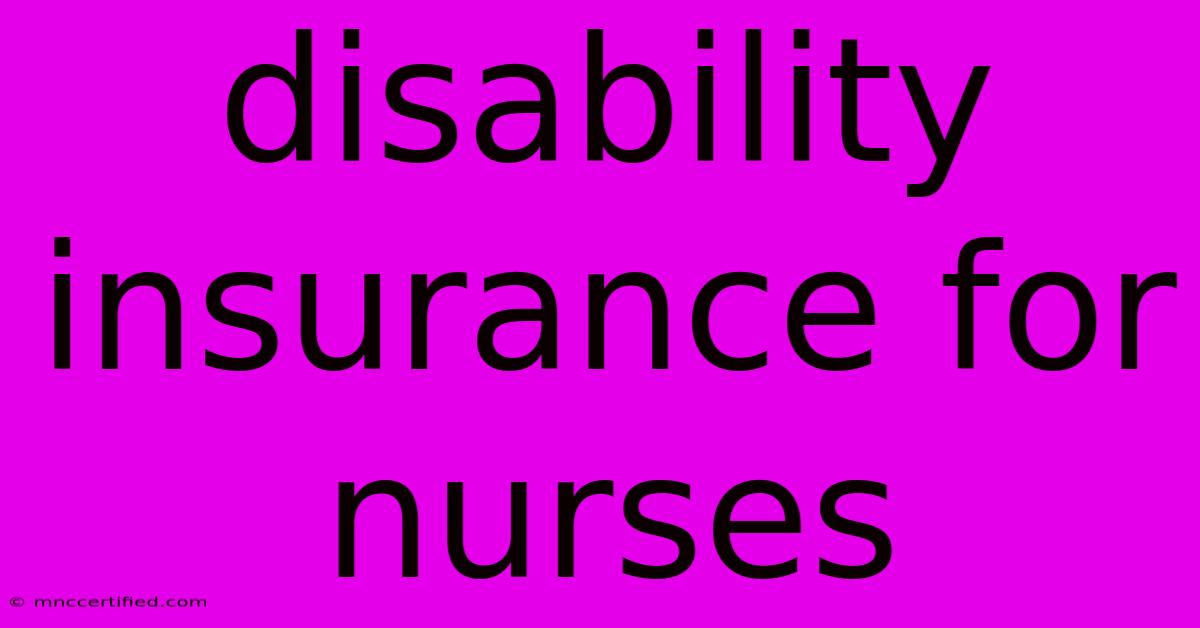Disability Insurance For Nurses

Table of Contents
Disability Insurance for Nurses: A Critical Safety Net
Nursing is a demanding profession, both physically and emotionally. Long hours, exposure to illness, and the constant pressure to provide excellent care can take a toll. This is why disability insurance for nurses is not just a good idea—it's a crucial component of financial security. This comprehensive guide explores the importance of disability insurance, the unique challenges nurses face, and how to choose the right policy.
Why Nurses Need Disability Insurance
Nurses are at a higher risk of experiencing disability compared to many other professions. The potential for injury, illness (both from patient contact and workplace stress), and burnout is significantly higher. A sudden inability to work due to:
- Physical injuries: Back injuries, repetitive strain injuries (RSI), and injuries from patient handling are common.
- Illnesses: Exposure to infectious diseases, chronic pain conditions, and mental health issues like burnout and depression can lead to long-term disability.
- Surgery and recovery: Even seemingly minor surgeries can result in extended periods of recovery, leaving nurses unable to work.
can lead to devastating financial consequences. Without disability insurance, a nurse facing a long-term disability could quickly find themselves struggling to cover medical bills, mortgage payments, and everyday living expenses.
The Gap in Traditional Coverage
Many nurses rely on their employer-sponsored disability plans. However, these plans often have limitations:
- Limited coverage: Employer-provided plans may only cover a portion of your income, leaving you with a significant shortfall.
- Short-term benefits: Some plans only provide short-term benefits, inadequate for long-term disabilities.
- Waiting periods: There's usually a waiting period before benefits begin, which can create financial hardship during the initial period of disability.
This is where individual disability insurance becomes essential. It provides a safety net beyond what your employer offers, ensuring you maintain a reasonable standard of living even if you can't work.
Types of Disability Insurance for Nurses
There are two main types of disability insurance:
- Short-Term Disability Insurance: Covers income loss for a limited period, typically 3 to 6 months. Useful for recovering from surgery or temporary illness.
- Long-Term Disability Insurance: Provides income replacement for an extended period, often until retirement age or recovery. Crucial for nurses facing chronic conditions or severe injuries.
Choosing the right policy requires careful consideration of your individual needs, including your income, expenses, and risk tolerance. It's vital to understand the terms and conditions, including benefit amounts, waiting periods, and exclusions.
Key Features to Consider
When comparing disability insurance policies, pay close attention to:
- Benefit amount: This should ideally replace a significant portion of your income, ideally 60-70%.
- Waiting period: The shorter the waiting period, the better, although shorter waiting periods usually mean higher premiums.
- Definition of disability: Policies may define disability differently; choose one that aligns with your profession's potential risks. Look for policies that offer "own occupation" coverage, which pays benefits even if you can work in a different occupation.
- Elimination period: This is the period before benefits begin. A shorter elimination period means faster access to funds but higher premiums.
- Premium cost: Balance cost with the level of coverage you need.
Finding the Right Disability Insurance for Your Needs
Finding the right disability insurance can feel overwhelming. Here's how to navigate the process:
- Assess your needs: Determine how much income you need to replace and the level of coverage you require.
- Compare quotes: Obtain quotes from multiple insurers to compare benefits, premiums, and features.
- Consult a financial advisor: A financial advisor can help you understand your options and choose a policy that fits your financial goals.
- Read the fine print: Carefully review the policy details before signing anything. Understand all the exclusions and limitations.
Disability insurance is a proactive investment in your future. It's an essential safeguard against the financial uncertainty that can accompany a disabling injury or illness. Don't wait until it's too late – protect yourself and your financial well-being with the right disability insurance plan. By carefully considering your options and understanding the intricacies of different policies, nurses can find the security they need to focus on what matters most: providing excellent patient care.

Thank you for visiting our website wich cover about Disability Insurance For Nurses. We hope the information provided has been useful to you. Feel free to contact us if you have any questions or need further assistance. See you next time and dont miss to bookmark.
Featured Posts
-
Newcastle Vs West Ham Tv Guide And Live Stream
Nov 26, 2024
-
Celtics Clippers Game Time And Tv
Nov 26, 2024
-
Microsoft Recovering From Recent Outage
Nov 26, 2024
-
Bottom Up Investing Vs Top Down
Nov 26, 2024
-
Band Aid 40 Geldofs Controversial Remake
Nov 26, 2024